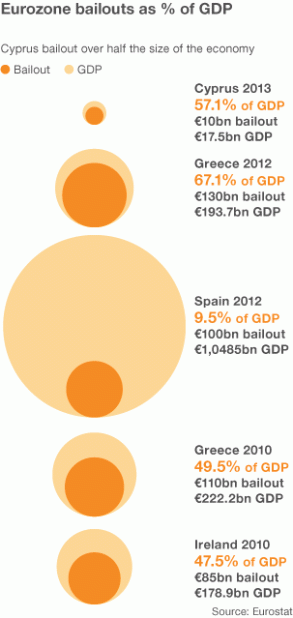“The study of money, above all other fields in economics, is one in which complexity is used to disguise truth or to evade truth, not to reveal it. The process by which banks create money is so simple the mind is repelled. With something so important, a deeper mystery seems only decent.” John Kenneth Galbraith (1908-2006 ), former professor of economics at Harvard, writing in ‘Money: Whence it came, where it went’ (1975).
Could it happen to you?
I’ve been following the Cypriot financial problem recently. An interesting euphemism caught my attention.’Deposit haircut’ – http://online.wsj.com/article/BT-CO-20130326-708329.html. I thought the term sounded puzzling. Everybody likes haircuts right? So why use it in that way I thought, like it’s just a minor inconvenience. Would you mind if your bank account was given a haircut? You only park your money in an account with a bank because you think it’s safe right? If on any given day it could be a given a 40% haircut, would you keep your money there?
In a nutshell
Here is a very quick and dirty explanation of the issue currently plaguing Cyprus. Basically, a few major banks of Cyprus are in bad shape after the Greek bailout debacle impacted severely on their balance sheets. The European Central Bank is offering a bailout, but one of the conditions is to use the uninsured money (deposits over 100,000 Euros) to services its debts. Some sources are stating 40% of funds above the maximum insurable amount. Under European Union law, depositors are only insured up to 100,000 Euros. Obviously, this will trigger people rushing to the banks and ATM’s to withdraw their money. So just as obviously, the banks have taken a holiday, capital controls have been implemented, and ATM’s are only dispensing a limited amount – http://www.youtube.com/watch?v=qzawVJ-75HU.
What does it mean for New Zealand?
The Cyprus fiasco has opened our eyes to the possibility of this happening in New Zealand, and is cited in this link – http://www.nzherald.co.nz/business/news/article.cfm?c_id=3&objectid=10873059. If you’d like to read and possibly decipher a consultation document named “Pre-position of Open Bank Resolution” by the Reserve Bank of New Zealand, then by all means http://www.rbnz.govt.nz/finstab/banking/4335146.pdf.
Sharing in the losses, but not the profits
There is currently no deposit insurance for New Zealanders. There is in Australia at current. But what does that mean? The fruits of labour which is already taxed at the source (P.A.Y.E), should not be used to bail out banks in my opinion. Why is the taxpayer so generous? They pay for wars and bailout banks, but they never seem to be getting any return on their investment. Just more interest to pay on debt. The OPM principle coupled with moral hazard spells D-I-S-A-S-T-E-R, as we have seen countless times throughout the past few decades. If banks want to be greedy, then they can risk the money of their largest investors. All the bank profits go to someones hands right? All those little fees and interest they charge us.
Fractional Reserve Banking has created money at the touch of a button, and the stroke of a pen. They then charge us substantial amounts of interest, and if we can’t pay, the house is foreclosed. The least they can do is spare us the haircut when they run out of cash!
“The banks do create money. They have been doing it for a long time, but they didn’t realise it, and they did not admit it. Very few did. You will find it in all sorts of documents, financial textbooks, etc. But in the intervening years, and we must be perfectly frank about these things, there has been a development of thought, until today I doubt very much whether you would get many prominent bankers to attempt to deny that banks create it.” H W White, Chairman of the Associated Banks of New Zealand, to the New Zealand Monetary Commission, 1955.



